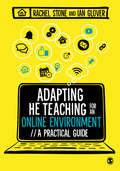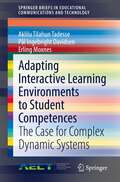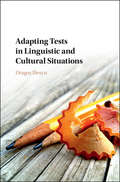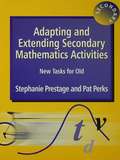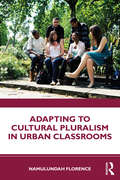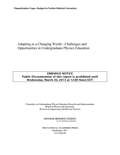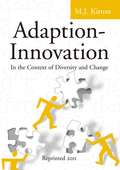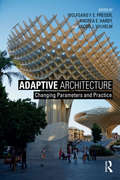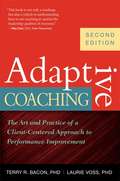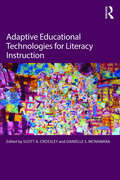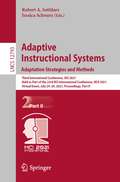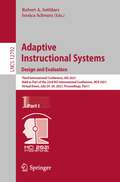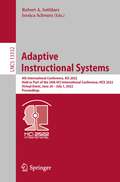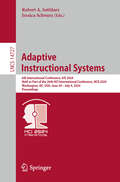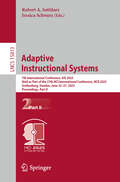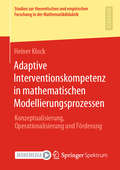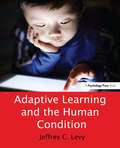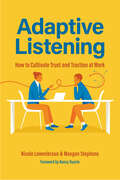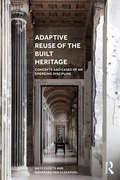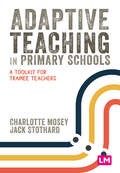- Table View
- List View
Adapting Higher Education Teaching for an Online Environment: A practical guide
by Rachel Stone Ian GloverFor busy academics of all subject disciplines who have been asked to convert their face to face teaching into an online model of delivery. The chapters present the steps that need to be taken to design and facilitate a high quality learning experience for students using a variety of modes and media. Each chapter includes a task and a checklist designed to help the reader through the transition process, covering such aspects as tools, structure, presentations, live and ‘on demand’ teaching, assessment, ideas for activities, inclusion and trouble-shooting.
Adapting Higher Education Teaching for an Online Environment: A practical guide
by Rachel Stone Ian GloverFor busy academics of all subject disciplines who have been asked to convert their face to face teaching into an online model of delivery. The chapters present the steps that need to be taken to design and facilitate a high quality learning experience for students using a variety of modes and media. Each chapter includes a task and a checklist designed to help the reader through the transition process, covering such aspects as tools, structure, presentations, live and ‘on demand’ teaching, assessment, ideas for activities, inclusion and trouble-shooting.
Adapting Interactive Learning Environments to Student Competences: The Case for Complex Dynamic Systems (SpringerBriefs in Educational Communications and Technology)
by Aklilu Tilahun Tadesse Pål Ingebright Davidsen Erling MoxnesThis monograph focuses on the design of personalized and adaptive online interactive learning environment (OILE) to enhance students’ learning in and about complex dynamic systems (CDS). Numerous studies show that students experience difficulties when learning in and about CDS. The difficulties are due to challenges originating from a) the structural complexity of CDS, (b) the production of dynamic behavior from the underlying systems structure, and (c) methods, techniques and tools employed in the analysis of such systems. Despite the fact that studies have uncovered such learning challenges, it is still not well understood how we may effectively address these challenges. In this monograph, the authors provide some answers as to how we may best improve our cognitive capabilities to meet these challenges by way of effective instructional methods, techniques, and tools and their implementation in the form of an OILE. The OILE developed for this purpose, builds on a five-step holistic instructional design framework; identification of instructional design models, identification of authentic learning material, identification of instructional methods, identification of instructional techniques, and design of the interface and implementation of the tool. In this OILE development, six well-documented instructional design models were considered; a four component instructional design, first principles of instruction, constructivists learning environment, task centered instruction, cognitive apprenticeship, and elaboration theory.
Adapting Tests in Linguistic and Cultural Situations (Educational and Psychological Testing in a Global Context)
by Dragoş IliescuThis book explores test adaptation, a scientific and professional activity now spanning all of the social and behavioural sciences. Adapting tests to various linguistic and cultural contexts is a critical process in today's globalized world, and requires a combination of knowledge and skills from psychometrics, cross-cultural psychology and others. This volume provides a step-by-step approach to cross-cultural test adaptation, emphatically presented as a mélange between science and practice. The volume is driven by the first-hand practical experience of the author in a large number of test adaptation projects in various cultures, and is supported by the consistent scientific body of knowledge accumulated over the last several decades on the topic. It is the first of its kind: an in-depth treatise and guide on why and how to adapt a test to a new culture in such a way as to preserve its psychometric value. Informs the practitioner by providing a complete picture of the test adaptation process. Draws upon theoretical publications and practical experience - a 'one-stop-shop' on matters related to test adaptation and translation. Presents a thoroughly researched, comprehensive perspective heretofore unrepresented in current literature.
Adapting and Extending Secondary Mathematics Activities: New Tasks FOr Old
by Pat Perks Stephanie PrestageThis book is designed to assist teachers to get the most out of the textbooks or mathematics schemes used in their schools, providing methods of extending the activities offered to learners.
Adapting to Cultural Pluralism in Urban Classrooms
by Namulundah FlorenceThis book helps teachers explore the origins of differing value structures in safe forums. It uses guided cross-cultural exchanges to help break down prejudices and foster an appreciation of other cultures and the essence of a common humanity. Acknowledging the inextricable link between cultural and structural factors in the plight of vulnerable student populations, this work focuses on how to help counter prevailing disparities in perceptions and expectations within school settings. Designed primarily for teacher candidates, this book offers educators a forum for recognizing the impact of primary backgrounds in teaching and learning. Adapting to Cultural Pluralism in Urban Classrooms focuses on four elements in the teaching/learning process: school climate; the views and expectations of teachers in solidarity with principals and policy makers; teacher interactions with students and parents; and the centrality of reflection to improve practice. It offers tools to support cultural adaptations that enhance the academic success of inner-city students served by predominantly white and more privileged teachers.
Adapting to Online and Blended Learning in Higher Education: Supporting the Retention and Success of the Expanded and Diversified Intake
by David Kember Robert A. Ellis Si Fan Allison TrimbleHigher education has undergone a massive transformation in teaching and learning in a very short period of time since the onset of Covid-19. Students, teachers and universities have had to adopt online and blended learning, often with little or no experience or models of good practice to draw upon. It is clear that blended and online learning are here to stay. This book draws on research from universities that have adopted online and blended learning to facilitate the expansion and diversification of their intake; which resulted in considerable experience and expertise in online and blended teaching. The book describes a model, tested with qualitative and quantitative data, which shows how teachers can support the retention and success of online and blended learners with four high-quality pedagogical elements: bite-sized videos of interest and relevance; learning materials that are well organised and provide a clear learning roadmap; discussion forums which are set up and moderated so as to result in lively student-student and student-teacher interaction; and, online teachers being approachable and responsive to communication with individual students through email, phone and online communication platforms. This model is explained and profusely illustrated with examples from the teaching of award-winning teachers. This book introduces the concept of a spectrum from traditional to contemporary models of admission and course delivery in higher education. It explains how universities which have adopted a contemporary model, with high levels of blended and online learning, have been able to expand their intake and markedly diversify the student body. It discusses how to support the retention and success of online and blended learners. Student support services are examined from the perspectives of service providers and online and blended learners and the case is made for support services being aligned with student needs. The book has a discussion of university management systems which utilise feedback at all levels to improve alignment between support service provision and student needs.
Adapting to a Changing World--Challenges and Opportunities in Undergraduate Physics Education
by National Research Council Division on Engineering and Physical Sciences Board on Physics and Astronomy Committee on Undergraduate Physics Education Research and ImplementationAdapting to a Changing World was commissioned by the National Science Foundation to examine the present status of undergraduate physics education, including the state of physics education research, and, most importantly, to develop a series of recommendations for improving physics education that draws from the knowledge we have about learning and effective teaching. Our committee has endeavored to do so, with great interest and more than a little passion. The Committee on Undergraduate Physics Education Research and Implementation was established in 2010 by the Board on Physics and Astronomy of the National Research Council. This report summarizes the committee's response to its statement of task, which requires the committee to produce a report that identifies the goals and challenges facing undergraduate physics education and identifies how best practices for undergraduate physics education can be implemented on a widespread and sustained basis, assess the status of physics education research (PER) and discuss how PER can assist in accomplishing the goal of improving undergraduate physics education best practices and education policy.
Adaption-Innovation: In the Context of Diversity and Change
by M.J. KirtonAdaption-Innovation is a timely and comprehensive text written for anyone who wants to know more about dealing with problem solving, thinking style, creativity and team dynamics. In an age when teams have become critical to successful problem solving, Adaption-Innovation (A-I) theory is a model in this field, which aims to increase collaboration and reduce conflict within groups. A-I Theory and associated inventory (KAI) have been extensively researched and are increasingly used to assist teambuilding and personnel management. In the context of the management of diversity and change, Dr Kirton outlines the central concepts of the theory, including the processes of problem solving, decision making and creativity as well as explanatory concepts such as the paradox of structure; coping behaviour; the distinction between how teams collaborate on the common task and how teams manage their own diversity. In addition, Dr Kirton focuses on the positive side of managing a wide diversity within teams that has the potential to lead to the highest levels of problem solving, creativity and effective management of change. The book offers practical information for those helping diverse teams succeed in today's demanding climate. In this fresh context, leadership theory is explored, suggesting a new and interesting approach in use of different styles. For those working with diverse, problem solving teams managing complex change, this is a must have book. It will appeal to a broad range of people, from practitioners such as human resource managers, psychologists, business consultants, and group trainers, to academics studying and doing research in disciplines such as psychology, business, management, sociology, education and politics and the practical use of the hard sciences. *This reprint contains some new insights by Dr. Kirton into the theory. A small number of critical key changes have been made: a new diagram showing the difference between decision making and problem solving; some tightening of some sentences to show that leadership style should be treated as roles; the addition of the Glossary of Terms.
Adaptive Architecture: Changing Parameters and Practice
by Andrea E. Hardy Jacob J. Wilhelm Wolfgang F. E. PreiserThe constant in architecture's evolution is change. Adaptive Architecture explores structures, or environments that accommodate multiple functions at the same time, sequentially, or at periodically recurring events. It demonstrates how changing technological, economic, ecological and social conditions have altered the playing field for architecture from the design of single purpose structures to the design of interacting systems of synergistically interdependent, distributed buildings. Including contributors from the US, UK, Japan, Australia, Germany and South Africa, the essays are woven into a five-part framework which provides a broad and unique treatment of this important and timely issue.
Adaptive Behavior and Learning
by Staddon J. E. R.Adaptive behaviour is of two types only. Either an animal comes equipped by heredity with the ability to identify situations in which a built-in response is appropriate or it has mechanisms allowing it to adapt its behaviour in situations in which the correct response cannot be predicted. Adaptive behaviour of the second type comes about through natural selection, which weeds out individuals that identify situations inaccurately or respond inappropriately. Adaptive behaviour of the second type comes about through the selection of behavioural variants by the environment. This book is about the second type of adaptive behaviour, of which learning is the most highly developed form. Adaptive Behaviour and Learning constitutes a provocative theoretical integration of the psychological and biological approaches to adaptive behaviour. John Staddon's ideas will have a major impact on psychologists and zoologists' conceptions of the problem of learning. Highly readable, the book will serve as a useful text for courses in learning, animal behaviour and comparative psychology.
Adaptive Coaching: The Art And Practice Of A Client-centered Approach To Performance Improvement
by Terry R. Bacon Laurie VossAdaptive Coaching offers a research-based approach to creating learning opportunities that will close the gap between expectations and results. Authors Bacon and Voss draw from over 2,000 case studies of Fortune 500 employees to show how people prefer to be coached, and offer the key tools and techniques required to identify each client's true needs.
Adaptive Educational Technologies for Literacy Instruction
by Scott A. Crossley Danielle S. McNamaraWhile current educational technologies have the potential to fundamentally enhance literacy education, many of these tools remain unknown to or unused by today’s practitioners due to a lack of access and support. Adaptive Educational Technologies for Literacy Instruction presents actionable information to educators, administrators, and researchers about available educational technologies that provide adaptive, personalized literacy instruction to students of all ages. These accessible, comprehensive chapters, written by leading researchers who have developed systems and strategies for classrooms, introduce effective technologies for reading comprehension and writing skills.
Adaptive Instructional Systems. Adaptation Strategies and Methods: Third International Conference, AIS 2021, Held as Part of the 23rd HCI International Conference, HCII 2021, Virtual Event, July 24–29, 2021, Proceedings, Part II (Lecture Notes in Computer Science #12793)
by Jessica Schwarz Robert A. SottilareThis two-volume set LNCS 12774 and 12775 constitutes the refereed proceedings of the 12th International Conference on Social Computing and Social Media, SCSM 2021, held as part of the 23rd International Conference, HCI International 2021, which took place in July 2021. Due to COVID-19 pandemic the conference was held virtually. The total of 1276 papers and 241 poster papers included in the 39 HCII 2021 proceedings volumes was carefully reviewed and selected from 5222 submissions. The regular papers of AIS 2021, Part II, focus on Learner Modelling and State Assessment in AIS.
Adaptive Instructional Systems. Design and Evaluation: Third International Conference, AIS 2021, Held as Part of the 23rd HCI International Conference, HCII 2021, Virtual Event, July 24–29, 2021, Proceedings, Part I (Lecture Notes in Computer Science #12792)
by Jessica Schwarz Robert A. SottilareThis two-volume set LNCS 12792 and 12793 constitutes the refereed proceedings of the Third International Conference on Adaptive Instructional Systems, AIS 2021, held as Part of the 23rd International Conference, HCI International 2021, which took place in July 2021. Due to COVID-19 pandemic the conference was held virtually.The total of 1276 papers and 241 poster papers included in the 39 HCII 2021 proceedings volumes was carefully reviewed and selected from 5222 submissions. The regular papers of AIS 2021, Part I, are organized in topical sections named: Conceptual Models and Instructional Approaches for AIS; Designing and Developing AIS; Evaluation of AIS; Adaptation Strategies and Methods in AIS.
Adaptive Instructional Systems: 4th International Conference, AIS 2022, Held as Part of the 24th HCI International Conference, HCII 2022, Virtual Event, June 26 – July 1, 2022, Proceedings (Lecture Notes in Computer Science #13332)
by Jessica Schwarz Robert A. SottilareThis book constitutes the refereed proceedings of the 4th International Conference on Adaptive Instructional Systems, AIS 2022, held as part of the 23rd International Conference, HCI International 2022, which was held virtually in June/July 2022.The total of 1271 papers and 275 posters included in the HCII 2022 proceedings was carefully reviewed and selected from 5487 submissions. The AIS 2022 proceedings were organized in the following topical sections: Learner Modeling and State Assessment for Adaptive Instructional Decisions; Adaptation Design to Individual Learners and Teams; Design and Development of Adaptive Instructional Systems; Evaluating the Effectiveness of Adaptive Instructional Systems.
Adaptive Instructional Systems: 6th International Conference, AIS 2024, Held as Part of the 26th HCI International Conference, HCII 2024, Washington, DC, USA, June 29–July 4, 2024, Proceedings (Lecture Notes in Computer Science #14727)
by Jessica Schwarz Robert A. SottilareThis book constitutes the refereed proceedings of 6th International Conference on Adaptive Instructional Systems, AIS 2024, held as part of the 26th International Conference, HCI International 2024, which took place in Washington, DC, USA, during June 29-July 4, 2024. The total of 1271 papers and 309 posters included in the HCII 2024 proceedings was carefully reviewed and selected from 5108 submissions. The HCII-AIS 2024 contributions have been organized in the following topical sections: Designing and developing adaptive instructional systems; adaptive learning experiences; AI in adaptive learning.
Adaptive Instructional Systems: 7th International Conference, AIS 2025, Held as Part of the 27th HCI International Conference, HCII 2025, Gothenburg, Sweden, June 22–27, 2025, Proceedings, Part I (Lecture Notes in Computer Science #15812)
by Jessica Schwarz Robert A. SottilareThe two-volume set LNCS 15812-15813 constitutes the thoroughly refereed proceedings of the 7th International Conference on Adaptive Instructional Systems, AIS 2025, held as part of the 27th HCI International Conference on Human-Computer Interaction, HCII 2025, which took place in Gothenburg, Sweden, in June 2025. The total of 1430 papers and 355 posters included in the HCII 2025 proceedings was carefully reviewed and selected from 7972 submissions. The two volumes cover topics as follows: Part I: Adaptive Training and Education; Cognitive Modeling of Adaptive Instructional Systems; Part II: Adaptive and Personalized Learning; Emerging Technologies in Adaptive Instruction.
Adaptive Instructional Systems: 7th International Conference, AIS 2025, Held as Part of the 27th HCI International Conference, HCII 2025, Gothenburg, Sweden, June 22–27, 2025, Proceedings, Part II (Lecture Notes in Computer Science #15813)
by Jessica Schwarz Robert A. SottilareThe two-volume set LNCS 15812-15813 constitutes the thoroughly refereed proceedings of the 7th International Conference on Adaptive Instructional Systems, AIS 2025, held as part of the 27th HCI International Conference on Human-Computer Interaction, HCII 2025, which took place in Gothenburg, Sweden, in June 2025. The total of 1430 papers and 355 posters included in the HCII 2025 proceedings was carefully reviewed and selected from 7972 submissions. The two volumes cover topics as follows: Part I: Adaptive Training and Education; Cognitive Modeling of Adaptive Instructional Systems; Part II: Adaptive and Personalized Learning; Emerging Technologies in Adaptive Instruction.
Adaptive Interventionskompetenz in mathematischen Modellierungsprozessen: Konzeptualisierung, Operationalisierung und Förderung (Studien zur theoretischen und empirischen Forschung in der Mathematikdidaktik)
by Heiner KlockHeiner Klock untersucht, inwiefern sich die adaptive Interventionskompetenz in mathematischen Modellierungsprozessen in der hochschulischen Lehrerausbildung verbessern lässt. Er stellt eine Interventionsstudie mit 169 Mathematik-Lehramtsstudierenden vor, die in einem fachdidaktischen Seminar mithilfe von Praxiselementen gefördert wurden. Anhand eines IRT-Ansatzes weist er nach, dass es sich bei der adaptiven Interventionskompetenz um ein zweidimensionales Konstrukt, bestehend aus Diagnose- und Interventionskompetenzen, handelt und dass eine Förderung im Rahmen der hochschulischen Lehrerausbildung möglich ist. Mithilfe von linearen Regressionen zeigt er Zusammenhänge der adaptiven Interventionskompetenz mit Überzeugungen und Selbstwirksamkeitserwartungen in mathematischen Modellierungsprozessen auf.Heiner Klock promovierte an der Fakultät für Mathematik und Informatik der Julius-Maximilians-Universität Würzburg. Derzeit ist er als Mathematik- und Physiklehrer am Gymnasium tätig.
Adaptive Learning and the Human Condition
by Jeffrey C. LevyAdaptive Learning and the Human Condition presents the basic principles of classical (Pavlovian) and instrumental (Skinnerian) conditioning in a more coherent and expansive manner than is the case in other textbooks. Learning is defined as an adaptive process through which individuals acquire the ability to predict, and where possible, control the environment. This overarching definition enables integration of traditional Pavlovian and Skinnerian principles and terminology and makes explicit why treatment of the learning process is essentially limited to these two historical research paradigms. Pavlov developed a methodology for studying animals under circumstances where they could predict, but not control, sequences of environmental events. Skinner studied animals under circumstances where their behavior had an effect upon environmental events. Observational learning and symbolic communication (i.e., spoken or written language) are incorporated as indirect learning processes through which individuals can acquire the ability to predict or control. This treatment creates a perspective within which it is possible to consider the fundamental nature of the learning process in understanding the human condition and in addressing significant individual and social concerns. Examples of applications and issues not included in similar textbooks include: The role of classical and instrumental conditioning in language acquisition The administration of rewards and punishers in Baumrind’s parental styles as related to Kohlberg’s stages of moral development Stone-Age hunter-gatherer and technologically-advanced cultures: How did we get from there to here? Self-control and self-actualization While covering traditional technical and theoretical issues, the book is written in a clear, engaging style. The narrative builds across chapters, culminating in the treatment of applications and societal concerns of import and interest to students and faculty alike. Upon completing this book, readers should be able to: explain the significance of human condition through adaptive learning; present the basic principles of classical and instrumental conditioning; and understand the significance of scientific research
Adaptive Listening: How to Cultivate Trust and Traction at Work
by Nicole Lowenbraun Maegan StephensThere Isn’t One Way to Listen. It’s Time to Adapt Your Listening!“Adaptive Listening is incredible. [It] made me evaluate all aspects of my interactions in life.” ─Workshop participant from Cisco#1 New Release in Running Meetings & Presentations and Human Resources & Personnel ManagementAdaptive Listening is for those who want to improve the way they, and their teams, communicate up, down, across, internally, and externally. Through engaging stories and practical techniques, discover a new model for listening in the workplace.Not just another book on communication. Adaptive Listening helps you up-level the under-trained side of communication amidst the realities of a hectic workday. Researched and tested exclusively in the work setting, Adaptive Listening moves you beyond active listening, embracing easy-to-remember techniques that strengthen relationships and get work done more effectively. Leaders at all levels can improve listening skills. Aspiring, emerging, and established leaders can build more awareness about their own listening style and the impact it has on their workday. Only then can they adapt the way they listen to meet the goals and needs of direct reports, peers, managers, customers, and stakeholders, all while contributing to a positive workplace culture.Inside learn:How to leverage the strengths and avoid the pitfalls of your listening style by recognizing how you prefer to process and respond to informationHow to break away from ineffective listening and step into Adaptive Listening to meet the goals and needs of the person speaking How to reduce mistrust, misalignment, and miscommunication by being more mindful of the barriers that prevent you from using empathetic communicationHow to cue other listeners to listen in the way you want and needIf you enjoyed You’re Not Listening, Just Listen, Listen Like You Mean It, Power Listening, Nonviolent Communication, or Crucial Conversations, you’ll love Adaptive Listening.
Adaptive Reuse of the Built Heritage: Concepts and Cases of an Emerging Discipline
by Bie Plevoets Koenraad Van CleempoelAdaptive reuse – the process of repairing and restoring existing buildings for new or continued use – is becoming an essential part of architectural practice. As mounting demographic, economic, and ecological challenges limit opportunities for new construction, architects increasingly focus on transforming and adapting existing buildings. This book introduces adaptive reuse as a new discipline. It provides students and professionals with the understanding and the tools they need to develop innovative and creative approaches, helping them to rethink and redesign existing buildings – a skill which is becoming more and more important. Part I outlines the history of adaptive reuse and explains the concepts and methods that lie behind new design processes and contemporary practice. Part II consists of a wide range of case studies, representing different time periods and strategies for intervention. Iconic adaptive reuse projects such as the Caixa Forum in Madrid and the Rijksmuseum in Amsterdam are discussed alongside less famous and spontaneous transformations such as the Kunsthaus Tacheles in Berlin, in addition to projects from Italy, Spain, Croatia, Belgium, Poland, and the USA. Featuring over 100 high-quality color illustrations, Adaptive Reuse of the Built Heritage is essential reading for students and professionals in architecture, interior design, heritage conservation, and urban planning.
Adaptive Teaching in Primary Schools: A toolkit for trainee teachers (Primary Teaching Now)
by Charlotte Mosey Jack StothardA guide for trainee and beginning teachers on Adaptive Teaching. This book explores what we mean by ′Adaptive Teaching′ and considers this in the current context of schools and teaching in the UK. It includes key theory to support trainee teachers′ foundation knowledge. Importantly, the text focuses on practical support for classroom teaching and includes suggested approaches and examples of good practice to learn from and adapt. ′How to′ guidance supporting trainees on placements and in their first years of teaching.
Adaptive Teaching in Primary Schools: A toolkit for trainee teachers (Primary Teaching Now)
by Charlotte Mosey Jack StothardA guide for trainee and beginning teachers on Adaptive Teaching. This book explores what we mean by ′Adaptive Teaching′ and considers this in the current context of schools and teaching in the UK. It includes key theory to support trainee teachers′ foundation knowledge. Importantly, the text focuses on practical support for classroom teaching and includes suggested approaches and examples of good practice to learn from and adapt. ′How to′ guidance supporting trainees on placements and in their first years of teaching.
